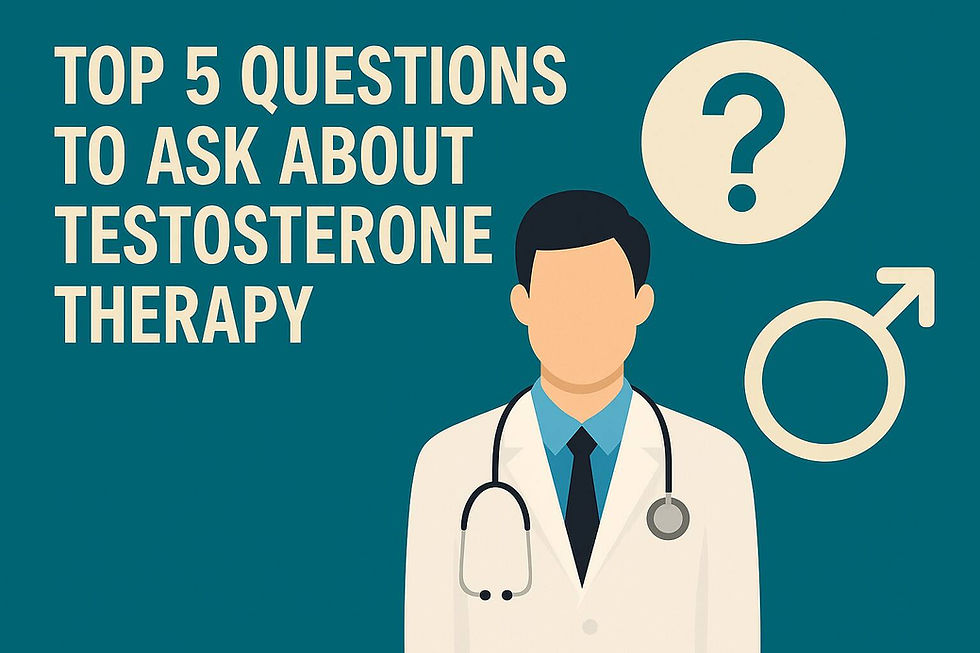Top 5 Questions to Ask Your Philadelphia Testosterone Therapy Doctor Before Starting TRT
- Chloe Madison
- Jul 28
- 3 min read

Testosterone Replacement Therapy (TRT) is a major health decision that requires careful consideration and medical guidance. For individuals experiencing low testosterone levels, consulting with a professional can lead to significant improvements in energy, mood, muscle mass, and overall well-being. However, before beginning the process, it’s important to understand the therapy, its benefits, and any potential risks. Asking the right questions helps ensure informed decision-making and tailored treatment plans.
Below are the top five questions to ask your Philadelphia Testosterone Therapy Doctor.
1. What Symptoms Suggest Low Testosterone?
Before any therapy begins, it’s crucial to confirm whether symptoms point to low testosterone or are linked to other medical issues. Common signs include persistent fatigue, reduced libido, mood changes, muscle loss, and weight gain. A qualified physician will conduct a full medical evaluation, including blood tests and a review of symptoms, to determine if testosterone therapy is the right option.
Patients searching online often use terms like “TRT Doctor Near Me” to find local professionals who specialize in hormonal health and understand the complexities of hormone deficiencies. This helps them connect with the right expert for personalized treatment in their area.
2. What Are the Risks and Side Effects of TRT?
Every medical treatment comes with potential side effects, and testosterone therapy is no exception. It is essential to ask the doctor about both short-term and long-term risks. Possible side effects may include acne, sleep disturbances, mood swings, or elevated red blood cell counts. Understanding these risks allows individuals to weigh the pros and cons before committing to a regimen.
When looking for a trustworthy TRT Clinic Pennsylvania, transparency about risks and outcomes is a hallmark of professional care. Clinics that prioritize education and patient safety tend to build stronger long-term relationships.
3. What Type of TRT Treatment is Recommended and Why?
Testosterone can be administered through injections, gels, patches, or pellets. Each method has its advantages depending on the individual’s health profile, lifestyle, and treatment goals. Asking the physician which method is most appropriate and why helps clarify expectations and makes the process more comfortable and effective.
During a consultation, a Philadelphia Testosterone Therapy Doctor will explain which delivery option suits the patient’s daily routine and health status. Factors such as convenience, dosage frequency, and absorption rates are often considered when selecting a method.
4. How Will Progress Be Monitored?
Monitoring is an essential part of testosterone therapy. Regular check-ups and lab work are needed to evaluate hormone levels and adjust the dosage if necessary. Asking about the follow-up schedule, necessary tests, and symptom tracking helps build a clearer picture of what the treatment journey will look like.
5. Are There Any Lifestyle Changes Required During TRT?
TRT alone cannot address every issue associated with low testosterone. Often, diet, exercise, sleep, and stress management contribute significantly to success. A knowledgeable physician will advise on supportive lifestyle habits that enhance the effectiveness of the treatment.
A TRT Clinic Pennsylvania that offers guidance on holistic health strategies is likely to produce better long-term results for patients. Incorporating health coaching or nutritional counseling into the plan can also lead to more sustainable hormone balance.
Conclusion
Beginning testosterone replacement therapy is a major health decision, and the first step is finding a medical professional who can answer key questions with expertise and honesty. Whether someone is searching for a Philadelphia Testosterone Therapy Doctor or evaluating clinics nearby, understanding the treatment options, risks, and lifestyle requirements is critical for success.
Asking these five questions not only helps in making informed choices but also builds trust between the patient and the healthcare provider. Selecting the right clinic or doctor ensures that the path to hormonal health is safe, personalized, and effective.


Comments